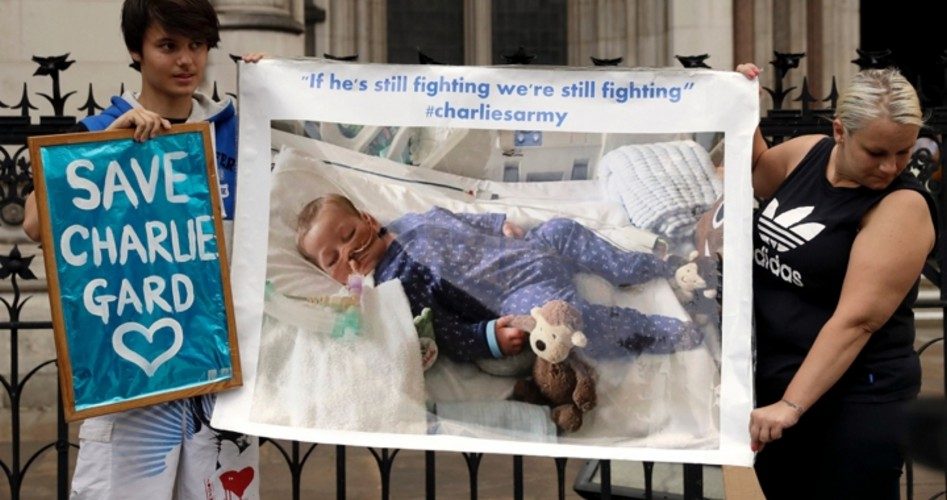
At London’s Great Ormond Street Hospital, a significant turn of events has transpired for 11-month-old Charlie Gard and his parents, as a U.S. physician will be allowed to examine and assess the child for possible treatment of his rare genetic disorder Mitocondrial Depletion Syndrome.
In a recent hearing in the case on Monday, July 10, a High Court judge gave Charlie’s parents, Chris Gard and Connie Yates, less than 48 hours to provide proof of an experimental treatment.
This hearing was arranged after new information was received regarding a possible remedy for Charlie’s disease. Officials at the hospital where the child is being held acknowledged, “Two international hospitals and their researchers have communicated to us as late as the last 24 hours that they have fresh evidence about their proposed experimental treatment.”
Still fighting for justice in the ever-evolving legal battle for the life of their son, Gard and Yates were given until 2:00 p.m. on Wednesday, July 12 to present evidence that the experimental treatment they want for their son will be beneficial. This information was to come before Friday’s hearing, where a final decision was to be made regarding Charlie’s life. However, an extension was given by High Court Judge Nicholas Francis in order to be “open-minded about the evidence” presented by Dr. Michio Hirano.
Dr. Hirano, a professor of neurology, is chief of the Neuromuscular Division of Columbia University, according to the university’s Department of Neurology. The doctor’s research focuses on mitochondrial diseases and genetic myopathies.
In testimony via a video link, Hirano said there was a “small, but significant” chance of the treatment improving Charlie’s illness, adding, “The only way to tell if the brain damage is reversible is by trying new therapy.”
The UK’s Independent reported:
[Dr. Hirano] said he has devised a treatment plan for Charlie, who would be given four strong doses of nucleoside bypass therapy, which is given orally or injected.
There was a 56 per cent chance the treatment would pass the blood-brain barrier, he said, adding that five patients in his trial had reduced their time spent on a ventilator by eight hours or more.
Dr. Hirano explained, “This is the best scientific data we have. These are small numbers, but with very rare diseases we must use every patient and gather as much detail from each patient as possible.”
Diagnosed shortly after birth with the rare genetic disorder, 11-month-old Charlie has spent the last nine months on life support at the London hospital. This life support has been precarious, however, as hospital officials have fought since April, against the parents’ wishes, to end Charlie’s life, claiming it would be in the infant’s best interest to “die with dignity.”
The parents’ devastating and exhausting fight seemed headed in a downward spiral, as various courts consistently upheld the hospital officials’ decision. However, a hearing held on Friday has offered fresh hope for them.
Dr. Hirano will examine Charlie on Monday, and then in an open meeting with the immediate caregivers and specialists on Tuesday, determine the extent of the child’s brain damage. This meeting will also be open to Yates, though her presence was initially opposed by hospital officials.
The hospital’s attorney asserted that due to the upsetting nature of the meeting, it would be best for the parents to be excluded from the meeting. At that moment Gard shouted out in frustration, “he’s our son,” and Yates shook her head. The couple’s attorney, however, argued that “Connie Yates has demonstrated a degree of knowledge and research that commands respect. She knows almost as much as anyone in the UK about this particular condition. In meeting after meeting, she has demonstrated a far greater command of the technical Issues than I have.”
Though, incredibly, the parents’ attendance would not typically be allowed, Justice Francis gave permission for Yates to attend, observing, “It may be unconventional, but this case is full of unconventional aspects.”
Since the High Court hearing in March, the proposed treatment for Charlie has been tested on mice, showing longer life and improved brain function. The Daily Mail quoted Dr. Hirano as saying, “We cannot fix or cure his disease, but I’m confident we can improve cognitive function. Charlie’s apparent brain damage could actually be a muscle problem causing brain ‘dysfunction,’ which the drug might fix.”
With new optimism will hopefully come a decision to allow Charlie a chance at life. The final decision is now to be made by July 25.
Photo: AP Images


